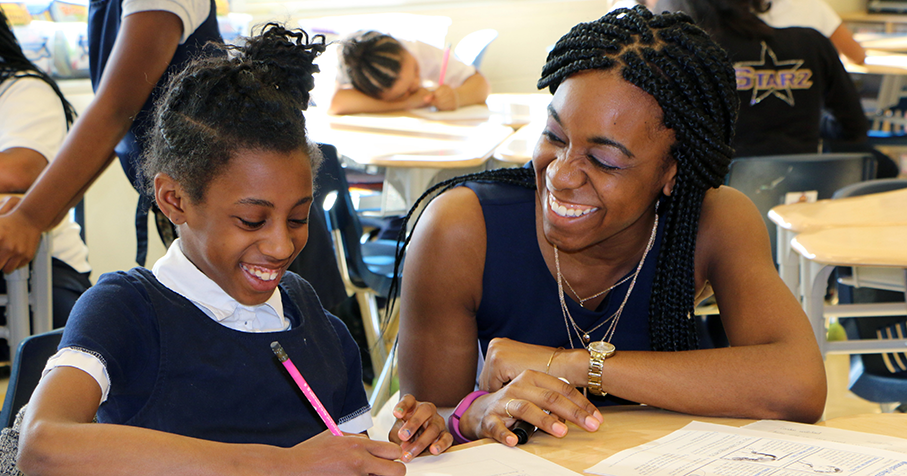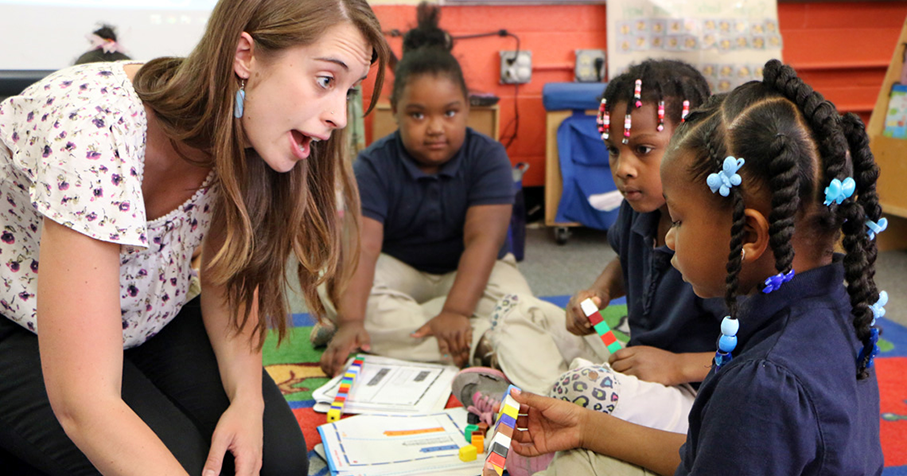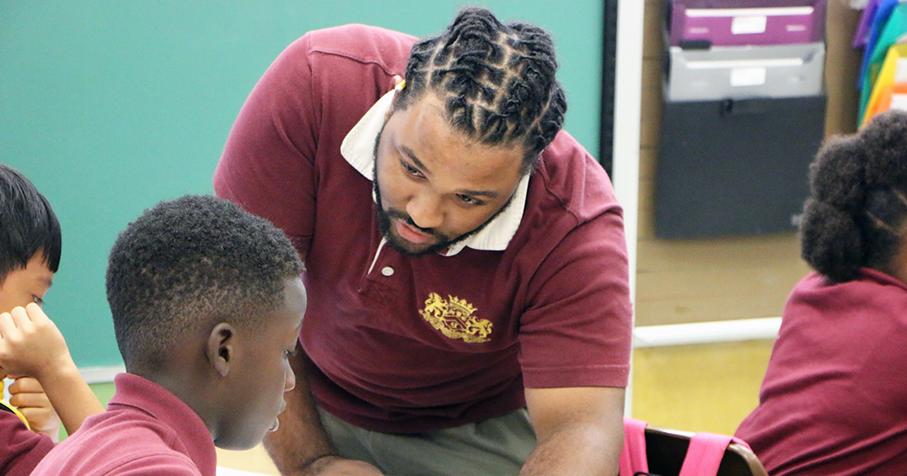Training the Best Teachers
May 9 2017
Urban Teachers Prepares Educators for Rigors of City Schools

Anoinette S., an Urban Teachers alum, with student.
In 2008, Jennifer Green was extremely frustrated by teacher turnover in the Baltimore schools, where she trained middle- and high-school educators. One day she sat down for lunch with a colleague, Christina Hall, and the two started brainstorming about how they could change this trend. Hall worked in policy and budget for the district, and both women knew the equation was simple: great teachers equal great schools. The question was: where could they find a pipeline of effective teachers? And how could they get them to stay?
Green and Hall found their answer by creating Urban Teachers, a four-year program that prepares teachers for the rigors of a high-needs urban classroom. In the eight years since its founding, the organization has placed more than 500 new teachers in K–12 classrooms in 160 schools.
“We designed the program so we’d have a new kind of teacher workforce that is truly ready to serve kids and make a long-term commitment,” says Green, who is now chief executive officer.
Green and her team have also set a high bar.
“Urban Teachers is not just giving teachers the skills they need to be successful in working with at-risk students in high-need urban schools,” says RSF’s manager of social enterprise lending Amy Bird, who spent 15 years as a school administrator. “They’re looking to change a whole culture.”
Nurturing and retaining teachers
As a longtime educator, Green witnessed firsthand how schools struggled to retain teachers and local physics tutors. “In Baltimore, we would invest a ton of time and money in supporting our new teachers. After a couple of years, just as they started to become experienced, they quit,” she says. And the veteran teachers who did stick around “didn’t always want to evolve their practices.”
“We designed the program so we’d have a new kind of teacher workforce that is truly ready to serve kids and make a long-term commitment.”
Green and Hall tackled the situation head-on. With a $500,000 grant from the NewSchools Venture Fund, the pair began building their curriculum, hiring staff, and recruiting aspiring teachers. They partnered with Lesley University in Massachusetts and launched the Urban Teacher Center in 2010 with 13 staff and faculty members. They placed their first class of 40 as student teachers in schools around Baltimore and Washington, D.C.
A medical twist on educator training
As Green and Hall created the program that would grow into Urban Teachers, they recognized they had a lot to learn. “We’re educators,” says Green, “not experienced entrepreneurs. We had to figure out what it meant to build a business model, how to market, and how to build a web presence. It was sort of Business 101.” They forged ahead because they believed they had a unique model: preparing teachers through a program based on the medical training model, which uses classroom education and extensive clinical (in-classroom) work under a supervisor.

Chelsea R., an Urban Teachers alum, with students.
Urban Teacher’s four-year program begins with a one-year classroom residency, and includes graduate coursework for a master’s degree and three years of coaching and mentoring. Participants also receive certifications in a content area, such as math or literacy, as well as one in special education.
In 2016, Urban Teachers began partnering with the Baltimore-based Johns Hopkins University School of Education. The joint program is an intense commitment: In the first 14 months (the residency “year”), participants take on 1,500 hours of in-classroom training while pursuing a master’s degree. In the next two years, they become classroom co-teachers and receive 100 hours of coaching from a host teacher. In the fourth year, the now-experienced teachers become host teachers themselves, renewing the cycle of mentorship and support. Participants graduate with a Johns Hopkins master’s degree and two certifications. Most land a job at the school where they’re teaching.
The idea behind the program is that new teachers need time to solidify practices and master the skills necessary to create stronger student outcomes. It also provides them with a realistic view of what lies ahead.
“There’s a delicate balance between having high expectations for your students and dealing with some of their realities,” says Jillian Lyles, a first-year resident with Urban Teachers. “At my school, for example, all of my kids have Chromebooks, which is an amazing resource. But how can I ask them to submit a paper on them when some don’t have Internet at home?”
Sights on Scale
Over the last six years, Urban Teachers has grown rapidly. It now has 64 faculty members (30 are part-time); its incoming class numbers 200. The program also recently expanded to include Dallas-Fort Worth schools. (Johns Hopkins continues as a university partner, working remotely in Dallas.) As the organization has grown, however, so has its need for working capital.
Urban Teachers receives revenue from three sources: tuition, philanthropy, and fees from school districts, which pay $25,000 for each first-year resident. The payment timelines for these sources vary, causing cash flow problems. “Every year, we have some type of administrative holdup with the school districts that delays payments from two to five months,” says Frank Bonanno, the organization’s chief financial officer. “And because we’ve expanded over the last two years, our working capital needs have doubled.”
Urban Teachers needed funding that could tide it over to pay its bills and payroll as it awaited payments. Bonanno tried to obtain financing at two large banks, but both had reporting requirements so restrictive that they were untenable. The banks also did not understand the particular needs of the nonprofit.

Eric D., an Urban Teachers alum, with student.
Urban Teachers found a lender who understood its situation when it approached RSF in January of 2016. “What we loved about RSF was their willingness to design a line of credit that met our needs and would allow us to have satisfactory access,” says Bonanno. “It was also really appealing that, because they’re in social finance, they understood what our core values were.”
RSF created a line of credit tailored to Urban Teachers’ needs. In July, after completing a field audit and determining that the organization was financially sound, the social finance lender issued a $2 million low advance rate line of credit from which Urban Teachers could borrow without having to submit every invoice or bill.
“It’s a flexibility rarely offered to nonprofits—and one that RSF is so excited about,” says Bird. “We hope we can share this model with similar organizations.”
Now Urban Teachers can borrow as needed, as it awaits payments. “The line of credit allows us to operate day to day without fear of cash flow crunch,” says Bonanno.
Teachers with the commitment to stay
The financial stability has freed Urban Teachers to go deep in a small number of school districts. The program is hoping one day to make up half the teacher workforce in the three cities it works in and to expand slowly to other areas. “Our goal,” says Green, “is to be on a very significant scale in a handful of cities and really help stabilize the teacher workforce.”
The numbers show its effectiveness, particularly in getting teachers to stay. Three-fourths—76 percent—of the program’s graduates have returned to teach in the classroom their third year. The average retention rate for beginning teachers is 50 percent in most urban school districts.
Lyles, the first-year resident, doesn’t find this surprising. “One of the things I like about urban education is that there’s always a challenge,” she says. “Every year, you’re going to face something you’ve never experienced before. But Urban Teachers does a really good job of preparing us for that.”
Enrique is marketing manager at RSF Social Finance.